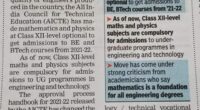Squares and Pythagorean Triplets
Class 8 Mathematics
Squares and Pythagorean Triplets – Multiple Choice Questions
| Q.No. | Question | Options |
|---|---|---|
| 1 | Is (1, 2, 3) a Pythagorean triplet? |
a) Yes b) No c) Sometimes d) Cannot determine |
| 2 | What is the sum of 1 + 3 + 5 + 7 + 9 without adding? |
a) 5² b) 6² c) 7² d) 8² |
| 3 | Which of the following is not a perfect square? |
a) 144 b) 1234 c) 256 d) 400 |
| 4 | Which of the following numbers has an even square? |
a) 11 b) 13 c) 15 d) 12 |
| 5 | Which of the following is a Pythagorean triplet? |
a) (1, 2, 3) b) (3, 4, 5) c) (2, 3, 4) d) (4, 5, 6) |
| 6 | What is the square of an odd number always? |
a) Even b) Odd c) Prime d) Composite |
| 7 | What is the square of an even number always? |
a) Even b) Odd c) Prime d) Composite |
| 8 | The square of which number is always less than the number itself? |
a) 1 b) 2 c) Fraction between 0 and 1 d) Negative number |
| 9 | What is the sum of 1 + 3 + 5 + 7? |
a) 4² b) 5² c) 6² d) 7² |
| 10 | What is the sum of 1 + 3? |
a) 1² b) 2² c) 3² d) 4² |
| 11 | What is the sum of 1 + 3 + 5? |
a) 2² b) 3² c) 4² d) 5² |
| 12 | Which of these numbers is a perfect square? |
a) 111 b) 139422 c) 2000 d) 121 |
| 13 | What is the Pythagorean triplet starting with 3? |
a) (3, 4, 5) b) (3, 5, 7) c) (3, 6, 9) d) (3, 8, 10) |
| 14 | What is the Pythagorean triplet starting with 7? |
a) (7, 14, 21) b) (7, 24, 25) c) (7, 8, 9) d) (7, 10, 12) |
| 15 | What is the Pythagorean triplet starting with 10? |
a) (10, 20, 30) b) (10, 11, 12) c) (10, 24, 26) d) (10, 15, 20) |
| 16 | How can 81 be expressed as a sum of odd numbers? |
a) 1+3+5+…+17 b) 1+3+5+…+15 c) 1+3+5+…+19 d) 1+3+5+…+13 |
| 17 | How can 121 be expressed as a sum of odd numbers? |
a) 1+3+5+…+19 b) 1+3+5+…+21 c) 1+3+5+…+23 d) 1+3+5+…+25 |
| 18 | What is the square root of 256? |
a) 14 b) 16 c) 18 d) 20 |
| 19 | What is the square of 25? |
a) 525 b) 625 c) 725 d) 825 |
| 20 | Which of these is not a property of perfect squares? |
a) They end with even number of zeros b) They end with 2, 3, 7, or 8 c) They end with 1, 4, 5, 6, or 9 d) Digital root is 1, 4, 7, or 9 |
| Answer Key | |||
|---|---|---|---|
| 1. b) No | 2. a) 5² | 3. b) 1234 | 4. d) 12 |
| 5. b) (3, 4, 5) | 6. b) Odd | 7. a) Even | 8. c) Fraction between 0 and 1 |
| 9. a) 4² | 10. b) 2² | 11. b) 3² | 12. d) 121 |
| 13. a) (3, 4, 5) | 14. b) (7, 24, 25) | 15. c) (10, 24, 26) | 16. a) 1+3+5+…+17 |
| 17. b) 1+3+5+…+21 | 18. b) 16 | 19. b) 625 | 20. b) They end with 2, 3, 7, or 8 |
Practice these questions to master the concepts of squares and Pythagorean triplets!
Subscribe
0 Comments


